Are Business School Neighborhoods Becoming More Gentrified?

When universities are found in downtown urban areas, gentrification most often follows. It almost seems inevitable since universities bring in more individuals with higher education, draw in more money, and increase new businesses. But what does the rapid increase of gentrification statistics mean for the business school students looking to start their career in a new area?
What Is Gentrification?
First, we need to look at what gentrification is. In simple terms, it’s the influx of more affluent residents moving into urbanized neighborhoods. At the outset, it may sound good, but it can be controversial.
Gentrification may improve the financial quality of a neighborhood, but it can also force the relocation of current residents and businesses due to increasing costs. Often, the process of gentrification also shifts a neighborhood’s racial and ethnic composition, as well as the average household income. This can lead to community displacement for lower-income families in gentrified areas, some of which often live in the area for several generations.
However, there is a grey area. Gentrification happens when a location becomes increasingly attractive. At that point, more high-income individuals move into the area bringing in investments in the community and leading to improved infrastructure and economic development.
What Causes Gentrification?
According to a recent comprehensive review of gentrification completed by researchers at UC Berkeley and UCLA, gentrification most often occurs when more public transportation is available. People are more attracted to transit hubs because they allow more privileged groups to trade car commutes for transit and signal a large-scale commitment to neighborhood upgrading, which, in turn, leads to increased employment opportunities.
Another spur to gentrification is education. Quality schools, universities, colleges, and medical centers tend to shape gentrification. The substantial federal support that public universities receive brings money into neighborhoods through many means including housing and housing subsidies for faculty and staff. A CityLab study revealed that universities and other academic institutions are key to attracting the creative class, creating more market demand and political pressure for better amenities, schools, and other services.
Analyzing University Neighborhood Gentrification Statistics
Since universities have such an impact on gentrification, we thought we’d take a look at what areas and schools have been most affected. While gentrification is not something most urban areas should aspire for, it happens, and it’s important to know where it’s occurring the most.
To find out, we looked at a recent study by RentCafe of the most gentrified areas in the U.S. The study took a look at the 2000 Census and the 2016 American Community Survey to see the changes that took place over a decade and a half across 1,000 U.S. ZIP codes. The study found that there are easy ways to quantify gentrification statistics when looking at median home value, median household income, and the population that holds a bachelor’s or higher degree.
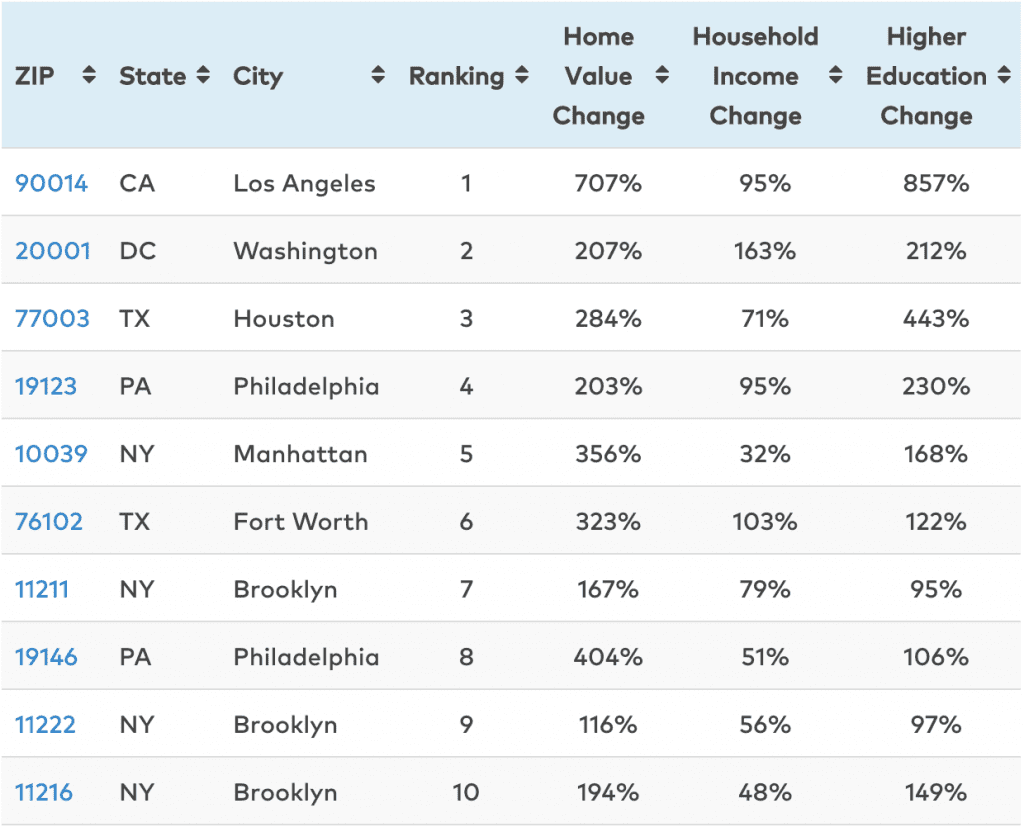
Based on the results of the study, we analyzed the top five MetroMBA universities in gentrified areas.
-
University of Southern California
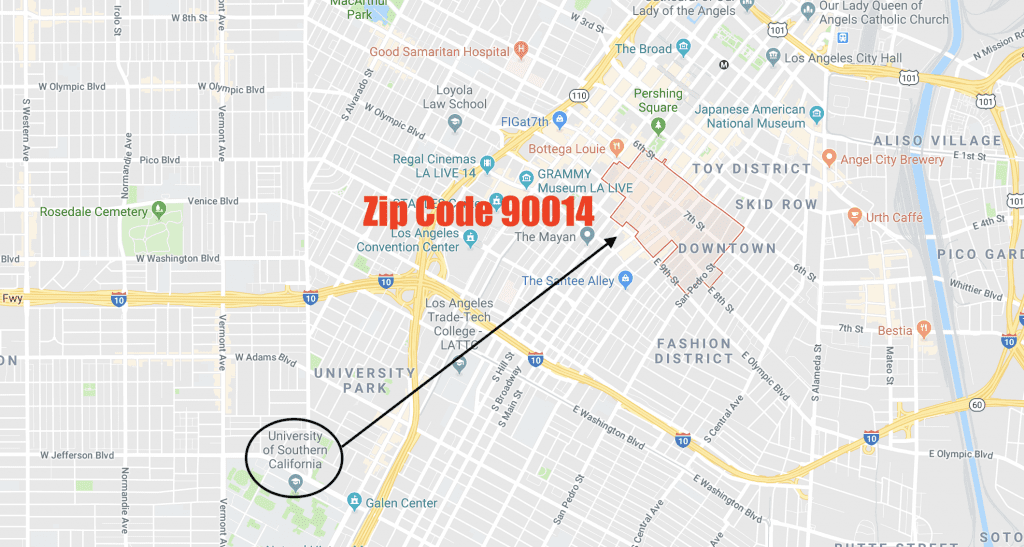
Located less than five miles away from ZIP code 90014 in Los Angeles, USC Marshall is just on the edge of the most gentrified area in the U.S. Over the last 16 years, this area has witnessed:
- A 707 percent increase in home values
- A 95 percent increase in median household income
- And an 857 percent increase in people holding bachelors or higher degrees
So, while some at USC might be fighting gentrification, it may not be working. Just last year, USC opened up a brand-new $700 million USC Village with a Target Express, Trader Joe’s, and 15 restaurants, transforming the surrounding neighborhood. And even though as part of the development USC provided $20 million for construction of off-site subsidized housing, there are still concerns.
“Across the street, land values are going to increase,” Joe Donlin, Associate Director of Strategic Actions for a Just Economy, told KPCC. “We know the landlords are going to rent at higher levels of rent.”
-
Howard University
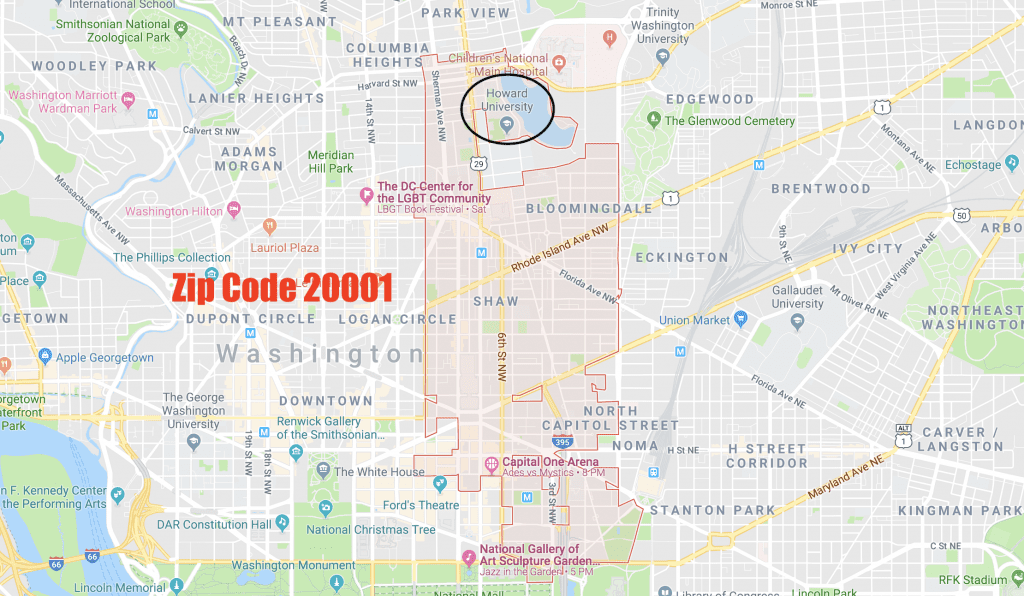
Located in Washington, D.C. Zip Code 20001, Howard University’s campus is located directly in the second most gentrified area in the U.S. Over 16 years, the area has witnessed:
- A 207 percent increase in home values
- A 163 percent increase in median household income
- And a 212 percent increase in people holding bachelors or higher degrees
The gentrification statistics of the Howard University area hasn’t gone unnoticed. According to NPR, there has been a drastic change:
“The area, located just a couple of miles north of Capitol Hill, was once working-class and black. But as hundreds of new residents move to D.C. each month, more non-black residents move into Howard’s neighborhood. And as property values rise, the university is trying to capitalize on the hot real estate market.”
-
University of Houston — Downtown
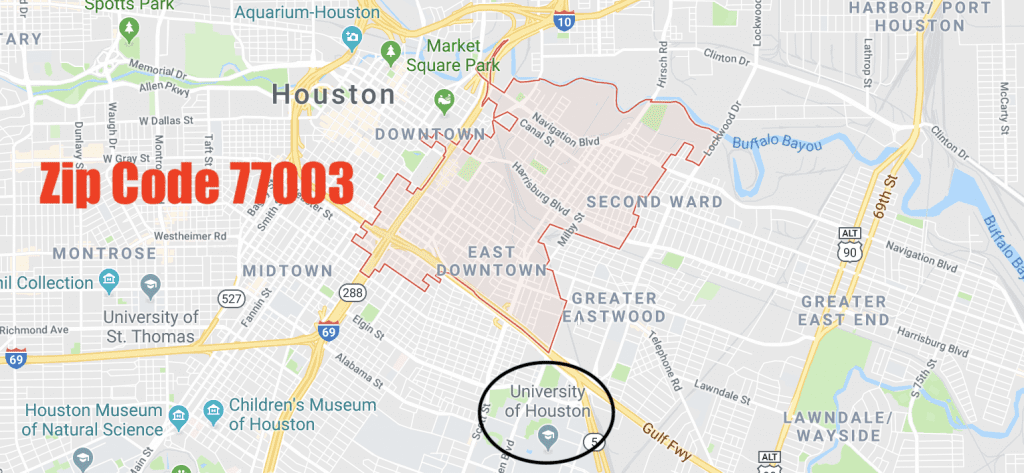
Located just steps away from zip code 77003, The University of Houston campus is located near the third most gentrified area in the U.S. In the last decade and a half, the area has seen:
- A 284 percent increase in home values
- A 71 percent increase in median household income
- And a 443 percent increase in people holding bachelors or higher degrees
Much of the gentrification can be laid at the university’s feet as its student housing footprint has expanded into surrounding neighborhoods over the last decades. According to the Houston Chronicle, “In the portion of the neighborhood closest to downtown, which includes Emancipation Park, median home values increased 176 percent between 2000 and 2013, according to an analysis of census estimates conducted by Governing.”
-
University of Pennsylvania
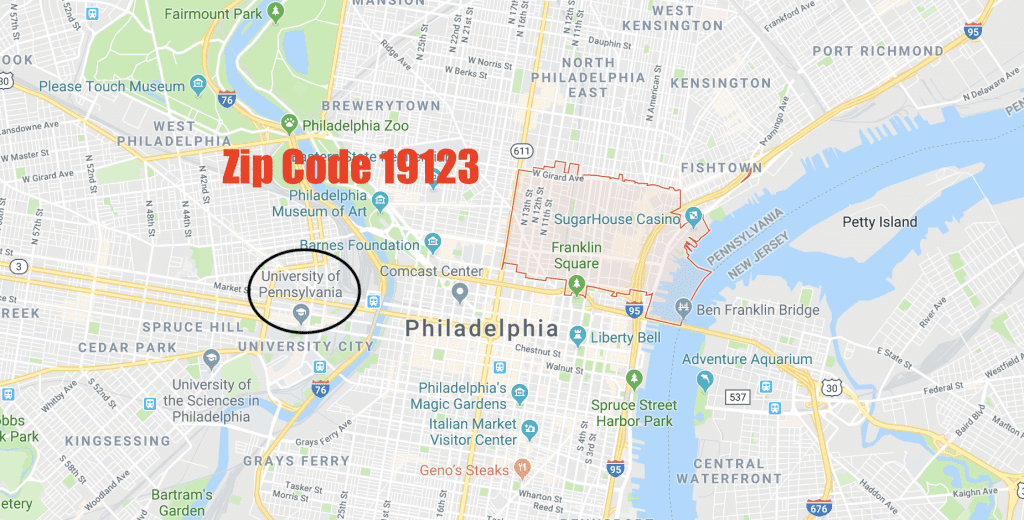
The Wharton School at UPenn is less than five miles outside the fourth most gentrified neighborhood in the country: zip code 19123. This area, over the last 16 years, has noticed:
- A 203 percent increase in home values
- A 95 percent increase in median household income
- And a 230 percent increase in people holding bachelors or higher degrees.
In fact, UPenn has had a complicated history with gentrification over the years, dubbed Penntrification by some. The problem, according to The Daily Pennsylvania, is that in West Philadelphia Penn students’ demand for housing is displacing low-income families. There have even been protests criticizing the university for causing gentrification in the area.
-
Texas Christian University
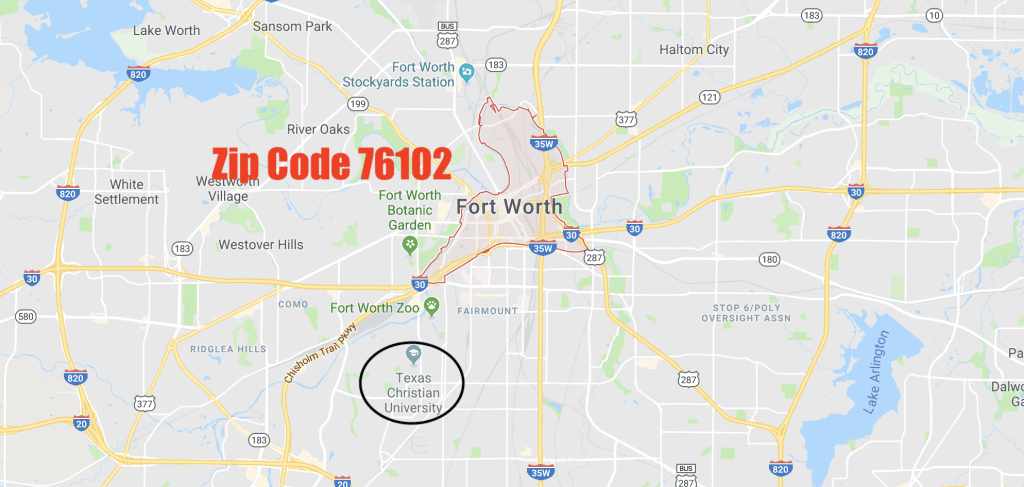
Fort Worth, TX, contains the sixth most gentrified area in the U.S.; just two miles away from Texas Christian University (TCU). Over 16 years, the area has witnessed:
- A 323 percent increase in home values
- A 103 percent increase in median household income
- And a 122 percent increase in people holding bachelors or higher degrees
While Fort Worth’s growth has brought new life to the city’s urban core, it’s also sky-rocketed property values. In particular, the areas around TCU are growing quickly. The university recently completed a $100 million renovation for its football stadium—just five years after its last overhaul, which reportedly cost $164 million.
The Five Biggest Texas Internship Destinations for MBAs

Whether an internship is optional or required for your MBA program, interning at top companies in your metro can not only offer hands-on work experience, but the chance to develop professional relationships that can shape the rest of your career.
Major Texas metros like Houston and the Dallas-Fort Worth area are increasingly becoming known for their roles in business and technology, making these cities the perfect spot for students to begin their professional careers with summer internships. Often these internships can lead to continued work and career opportunities after graduation. For example, 100 percent of students at a top MBA program like TCU’s Neeley School of Business earned internships in 2016, nearly half of whom continued projects for their employer on into the following year.
The Five Biggest Texas Internship Destinations
Hewlett Packard (HP)
Headquartered in Palo Alto, CA, the multinational informational technology company, HP, has a strong presence in Texas’ biggest metros. With a massive range or products, from personal computers to 3D printers, HP has 55,000 employees around the world and a net income of $2.53 billion USD.
HP and their separate Enterprise Service business, Hewlett-Packard Enterprise, offer a number of internships for MBA students and are considered one of the top intern destinations for schools like the Naveen Jindal School of Management at the University of Texas at Dallas and Rice University’s Jones Graduate School of Business.
HP offers a 12-week paid summer internship program for students in a variety of fields. Current openings include positions like:
- Personal Systems MBA Project Management Intern (HP)
- Personal Systems MBA Marketing Summer Intern (HP)
- Financial Associate MBA Intern (Hewlett Packard Enterprise)
Texas Instruments
It likely doesn’t come as a surprise that technology company Texas Instruments, headquartered in Dallas, is a top employer for MBA interns in the region. The company, which as of 2017 had a profit margin of $3.68 billion, has a number of different career paths available for their interns, with rotational opportunities after students have graduated that can help accelerate their career. Business roles at the company include focuses such as Finance and Operations, Human Resources, Information Technology, Marketing Communications, and Supply Chain Analyst.
With internship opportunities in engineering as well as the business fields, Texas Instruments consistently tops lists for MBA interns in programs like the aforementioned TCU Neeley School of Business and other top Dallas schools.
AT&T
Headquartered in Dallas, AT&T today is the world’s largest telecommunications company and second largest provider of mobile phone services in the country. And with 254,000 employees worldwide, it makes sense that this massive company would seek to create a talent pipeline for MBA students in the area. AT&T tops the list as an internship destination for students in schools like Texas A&M University’s Mays Business School and Jindal at UT Dallas, among others.
AT&T offers summer internships in a number of different focuses and fields, which provide real-world projects, specialized training programs and leadership exposure. Currently open positions with the company include a Leadership Internship, Finance Internship, and Software Development Internship.
Deloitte
Another company making an impact for student interns at schools like Neeley, Rice, and Mays, is “Big Four” accounting organization Deloitte. The company is headquartered in London but with over 263,000 employees throughout the world. In 2017, Deloitte officially became the fourth largest privately owned company in the United States.
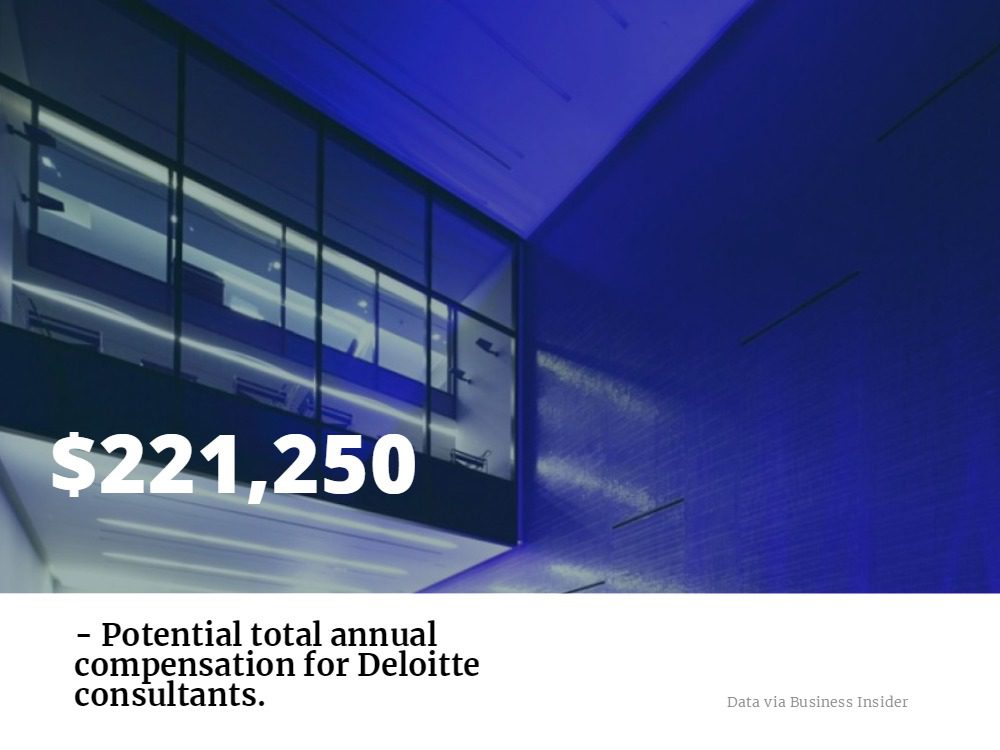
Deloitte’s commitment to recruiting talented finance students is reflected in the many MBAs who find both internships and full-time positions with the company. A Texas internship at Deloitte typically last eight to ten weeks during the summer and continue through at least one semester of the school year. MBA student interns have access to a number of incredible resources during their internship at Deloitte, including a consulting immersion program, women’s leadership launch, and the chance to participate in a number of case competitions.
Accenture
With headquarters in Dublin, Ireland, the work of global management consulting company Accenture may seem worlds away from Texas, U.S. But with nearly 500,000 employees around the world, this Fortune Global 500 company has left its mark as a top employers of MBA interns at schools like TCU Neeley and Rice’s Jones School of Business.
Accenture’s internship program is a ten to twelve week experience throughout the summer that encourages students to empower themselves through innovation. Student interns have access to programs like the Student Leadership Conference, Buddy Program, Summer Analyst Day of Service, and group outings. Those who are able to turn their internship stays with Accenture may also be awaiting a hefty payday when it comes to full-time employment after earning an MBA.
“According to Management Consulted, post-MBA salaries at Accenture hover around a base salary of $140-145,000 with a $25,000 signing bonus, an $8,000 relocation check and a performance bonus up to $44,000. Interns typically clock $31 per hour, plus overtime and a signing bonus.”
Temple Winners, Wharton Blockchain, and More – Philly News

Summer may be just beginning, but that doesn’t mean class is out for Philadelphia business school news. Here’s this week’s Philly news brief.
Fox School Announces Second Annual IMPACT Award Winners — Fox Newsroom
The Temple University Fox School of Business recognized outstanding staff members at the second-annual IMPACT Awards ceremony late last month, honoring staff who demonstrated the ability to collaborate effectively as groups to deliver impactful service, teaching, and research contributions. The awards are also held with Temple’s School of Sport, Tourism, and Hospitality Management.
This year, 16 groups representing the accomplishments of 70 faculty and 86 staff members earned nominations. The three winners were:
- The Fox Global Immersion program
- The Temple University Entrepreneurship Academy (TUEA)
- The Fox Center for Undergraduate Advising.
Winning groups took home glass trophies, customized merchandise to commemorate the achievement, a special group experience, and financial rewards.
To read more about the winners, click here.
Penn Launches Strategic Collaboration with Ripple — Wharton News
The University of Pennsylvania Wharton School and the School of Engineering and Applied Science recently announced the launch of The Ripple Project: a collaboration with blockchain-based global payments leader Ripple that aims to support academic research, technical development, and innovation in blockchain, cryptocurrency, and distributed ledger technology.

Geoffrey Garrett, Dean of the Wharton School, proclaimed during the announcement that:
“Blockchain represents the fusion of technology and finance spanning schools and disciplines well beyond Wharton. The Ripple Project will transform the way our students and faculty look at blockchain and its potential to change the world. We are thrilled to welcome Ripple’s collaboration as we prepare future leaders who will shape the future of how this dynamic technology is developed to transform fields as diverse as finance, logistics, and healthcare.”
Penn is one of only 17 universities around the world partnering with Ripple and its University Blockchain Research Initiative. Each university has the autonomy to determine its own research topics and areas of focus.
You can read more about this exciting news here.
EMBA vs MBA: Which Is Right for Me? — LeBow News
The LeBow College of Business recently published an article to help prospective MBAs choose between their EMBA and MBA programs. The piece compares and contrasts the Experience Level, Class Style, and Curriculum of both programs.
MetroMBA has ranked LeBow’s EMBA as one of the best in the Philadelphia metro area. Check out how the two degree programs match up here.
Drexel Culinary Collaborations and First Place Finishes — Philly News

With so much news happening in Philly business schools, it’s understandable if you need a hand catching up. Here’s your Philly news brief.
Drexel EMBA Class Spurs Culinary Collaboration — LeBow News
Thanks to his Drexel LeBow College of Business EMBA class, chef and restaurateur Kevin Sbraga has found a way back into the kitchen. Sbraga, a chef with prior business experience in the Philadelphia area, came up with the idea for a one-day pop-up kitchen in a Business Problem Solving class taught by associate clinical professor of management Suresh Chandran.
According to a news story on the Drexel website:
“We were talking about innovation as a disrupter, and that made me start to think about how the real estate landscape is changing for retail as well as restaurants,” Sbraga says. “I reached out to a hospitality buddy of mine who has some experience in the tech field. I asked him, ‘How can we create a virtual restaurant? A restaurant experience without the brick and mortar,’ and his response was ‘delivery’.”
Sbraga was one of the first restaurateurs in the city to adopt the now-popular food delivery app Caviar, helping deliver the first batches of Nashville hot chicken to Philly for a special one-day event. “The Hot Chicken was far and away the best-selling dish from The Fat Ham’s menu on Caviar. It was widely regarded as some of the best hot chicken outside of Nashville, so featuring it was an easy choice,” a Caviar spokesperson said.

LeBow EMBA grad and chef Kevin Sbraga was one of the first in the city of Philadelphia to help introduce the now-popular food delivery app Caviar.
You can read more about Sbraga’s food and pop-up concept here.
Penn State Smeal MBAs place first in Fisher Invitational Big Ten+ MBA Case Competition — Penn State Smeal News
Four Penn State Smeal MBAs recently took first place in the Fisher Invitational Big Ten+ MBA Case Competition at Ohio State. The team of first-year students were coached by Nancy Mahon, clinical associate professor of business communication.
Teams had 24 hours to develop a comprehensive pitch outlining concrete recommendations to address the challenges facing Bob Evans restaurant chain. Competition judges included key Bob Evans senior leadership as well as executives from other corporations. The Smeal squad defeated teams from Illinois and Wisconsin in first round before beating second-place Purdue and third-place Michigan State in the finals.
“I’m extremely impressed with our team’s efforts and professionalism,” Mahon said. “I’m especially proud of our students’ representation of Smeal.”
You can read more about the recent Penn State Smeal event here.
Is It Possible to Change Bad Behavior – Permanently? – Knowledge@Wharton
The recently-created Behavior Change for Good Initiative course at The Wharton School, taught by celebrated UPenn professor Angela Duckworth and Wharton’s own Katherine Milkman, looks at the quality of daily living in a broad and curious way.
In the most recent Knowledge@Wharton podcast episode, the two discuss the program’s vast social experiment angles, asking how people can change bad or not-well-liked behavior on a permanent scale. This includes the launch of the StepUp program with fitness chain 24 Hour Fitness. “Duckworth and Milkman are hoping to recruit hundreds of thousands of current and new members of the chain to sign up for the program,” they explain “Those who do will become part of a large-scale tournament in which scientists have developed 57 different paths they hope will lead to positive behavior change.”
“We want to see which ideas truly yield the biggest changes in behavior, not just during the course of the program, which is 28 days, but also in the year following it.”
You can check out the most recent podcast episode here.
Admissions Tip: How to Reapply to Business School

Consulting expert Alex Brown from Clear Admit recently offered up four incredibly valuable tips for potential students who want to reapply for a business degree, which you can read below.
With many MBA programs getting close to being ready to release their final round decisions, the application season will soon be coming to a close. While we would like to hope that today’s topic isn’t apropos for too many of our readers, we wanted to offer some advice to applicants who’ve been rejected from their preferred programs and are planning on reapplying next season. While it’s important to take some time to deal with the disappointment, it’s never too early to begin thinking about the next season, and there are a number of steps you can take to improve your candidacy and move toward a stronger application.
Reevaluate.
While it’s certainly difficult when things don’t go as planned, this is actually a great chance to take stock of your career and goals and to make sure that an MBA is still a logical and necessary step at this point. It’s this sort of reflection that can lead to refined career goals and a clearer sense of the reasons you need a business education.
Revisit your applications.
Once you’ve gained some distance from the emotional and time-consuming application process, it’s wise to review the materials you submitted to the schools with a critical eye. Having learned much about the process simply by applying, it’s likely that you’ll be able to identify a number of things that you could have done better. Whether you suspect your downfall was something like a strategic misstep in an essay or interview or a more glaring weakness like a low GMAT or lack of extracurricular involvement, there is plenty of time to address your shortcomings before submitting an application next year.
Consider your data points.
Your results this year may reflect some valuable information about your competitiveness at a top program. It’s important that you only apply to schools that you would be happy attending, but if you were unsuccessful at all of the programs to which you applied, it might be time to think about how realistic your list of target schools was and to add a few more to the mix. This is especially true for applicants who only applied to one or two programs this time around; there is an element of randomness and luck in the admissions process, and no matter how qualified the applicant, we recommend that a candidate target four to six programs to have a strong chance of success.
Schedule a feedback session, if applicable.
While it’s possible that you’ve identified your weaknesses in retrospect or even were aware of them when you went into the process, if you’ve been denied by a school that offers feedback to applicants and are planning on reapplying, you should absolutely take advantage of this opportunity to learn of the adcom’s perspective and demonstrate your commitment to the program. In fact, reapplying without seeking feedback when offered can raise questions for the adcom about how seriously an applicant is taking the process and the school. Of course, some schools do not offer feedback to anyone and others, such as Tuck, selectively offer feedback only to particularly promising candidates. There is naturally high demand for this service at programs that provide slots on a first-come, first-served basis, so it’s important that you make a point of requesting a feedback session at the earliest possible time.
Finding the Best Real Estate MBAs in Los Angeles

Over the past few years, MBA programs and courses in real estate have seen continued growth, as both interest and need have become undeniable throughout the country. With property values and real estate often having a tremendous impact on the overall economic health of the nation, educating and placing top talent in this sector can be vital. But how can you turn a valuable MBA into a lucrative career in Los Angeles real estate?
Although a business focus on real estate is nothing new, the idea of MBAs concentrating in the industry as part of their degree has been getting increasingly more popular. It is somewhat difficult to find MBA programs that offer specializations in the field, even though 2017 saw more than $5 billion invested into real estate technology—a massive increase since the Great Recession. Startups like Airbnb and WeWork area also changing the way the real estate industry overlaps with entrepreneurship and technology, making it even more important for a workforce of talented individuals helping to guide the industry going forward.
Los Angeles, long at the center of discussions about urban development and city planning, features some of the country’s most vital real estate business program. Take a look at the three of the best Los Angeles real estate MBA programs below.
Marshall School of Business – USC
USC’s Marshall School of Business allows students in the full-time MBA program specialize their degree in real estate through electives that focus on topics like investment, finance, valuation, law, development, and the economics of real estate markets. This degree will prepare students for a variety of careers in the Los Angeles real estate field, pairing a focus on the unique aspects of the real estate field with the acknowledgement that success in the real estate field relies still relies on fundamentals like management, marketing, strategic planning, and economics.
The USC MBA in real estate is unique in the student’s ability to tailor the curriculum to their own career and educational needs, acknowledging the wide variety of roles within Los Angeles real estate, such as investment and asset management, consulting, valuation, asset management, and more.
Below are just a few Graduate Real Estate courses offered for MBA students at Marshall:
- Mortgage-Backed Securities and Markets. This course, which includes lectures, assignments and a project, looks at residential and commercial mortgages as well as mortgage-backed securities and markets.
- Urban Land Use-Feasibility Studies. This course consists of a team field study analysis of a prospective development site. Students will work together with a client to address issues like design, entity choice, deal structure, land use, economic analysis, and allows teams to interact with industry professionals throughout the process of developing their proposals.
- Real Estate Finance and Investment. This course consists of both cases and lectures, as well as assignments and exams to evaluate student’s understanding of valuation, projects, financing, and investment analysis. Students will also learn to use ARGUS 7.0, one of the top real estate investment software packages used throughout the industry.
Anderson School of Management – UCLA
The real estate MBA focus at UCLA’s Anderson School of Management has consistently been named among the best real estate programs in the country, let alone Los Angeles. The real estate concentration at Anderson trains students to join the industry through a strong education in real estate financing, investing, and entrepreneurial development. The concentration is integrated into the school’s overall MBA program, with the option for many real estate-centered electives, providing both theoretical and practical study in the most important aspects of the industry.
YOU MAY ALSO LIKE: The Top 5 Schools for an MBA in Real Estate
The Anderson School of Management also recognizes that real estate is not just a matter of business, and encourages MBA students to seek classes in other departments at UCLA, including public policy, urban planning, architecture, engineering, taxation, and law.
Below are some popular electives available to Real Estate MBA students at Anderson:
- Urban Real Estate Financing and Investment. This course helps students to bridge the gap between theory and practice in real estate finance and investment, training students to use finance and economics to uncover insights about real estate markets and investments.
- Entrepreneurial Real Estate Development. This course looks at real estate through the lens of entrepreneurship, helping students identify market opportunity, product definition, and conceptual feasibility through work in an entrepreneurial environment.
- Public Policy Clinic: Land Use, the Environment and Local Government. Acknowledging the interdisciplinary nature of this field, this course will provide students with a solid education in the complicated connections between land use control, state and local government law, and environmental quality
The Paul Merage School of Business – University of California, Irvine
At the Merage School of Business‘ Center for Real Estate, students can earn an MBA Certificate in Real Estate and Urban Development, with a curriculum just as dynamic and diverse as the marketplace itself. The MBA certificate presents students with a holistic approach to real estate, using lessons from past trends and cycles within the industry to help students prepare for a career in this often volatile industry.
Students who have at least two years of study in a Merage MBA program are eligible to pursue this certificate after successful completion of certain prerequisites in real estate. After completing these courses, students can choose from a number of electives connected to the certificate, such as:
- Real Estate Capital Markets
- The Real Estate Development Process
- International Real Estate
- Applied Real Estate Security Analysis and Portfolio Management
- Practicum in Mixed-Use Community Development
